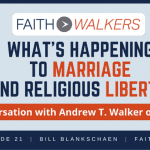This a guest post from Dr. Brian Mattson, Senior Scholar of Public Theology for the Center For Cultural Leadership. Follow him on Twitter (@BrianGMattson) and bookmark his website. His newest book is Politics & Evangelical Theology: A Guide For Concerned Christians and Political Progressives.
Stinging electoral defeats always produce huge amounts of angst, second-guessing, and hand-wringing, and the one that took place for Republicans on November 7th is no exception. Is it immigration policy? Was our candidate too moderate? Is it the GOTV app that failed on Election Day? Has our cause simply lost over 50 percent of the country?
In principle, I am not against some self-reflection and assessment of what went wrong so long as it doesn’t devolve into cannibalizing the party or petty score-settling. But even when it is thoughtful, hasty analysis can bring rather hasty conclusions.
Waning Evangelical Influence?
King’s College professor and WORLD magazine writer Anthony Bradley penned this article, “Waning Evangelical Influence,” in which he suggests that the evangelically influenced set of social norms and values that shaped American life and public policy for nearly three centuries might be history. “The 2012 Republican platform, which embraced many of those norms and values,” he writes, “was clearly rejected by more than half of the American electorate.”
That word “clearly” makes it a hasty conclusion. The overall American electorate was significantly smaller this year than in other recent elections. Barack Obama’s numbers were down a whopping 8 million in 2012 compared with 2008 (seeming to reflect a heavy movement away from Mr. Obama’s brand of liberalism), and Mitt Romney failed to retain all the voters John McCain had won four years earlier. In other words, we do not have a very reliable metric to really know what the “American electorate” thinks, since a substantial portion of that electorate (frustratingly) failed to give us any indications.
We should not take it as gospel that over half the country disapproves of those Judeo-Christian norms and values (e.g., strong private property rights, sanctity of human life, and the importance of the family for society). Not only could that very well be wrong, but could result in a self-fulfilling prophecy. Believe you’re outnumbered, act like you’re outnumbered, and it is quite probable you’ll soon be outnumbered. Acting like a loser generally ensures losing. That is why the Progressive Left desperately wants evangelical Christians to believe they are outnumbered. Why else would the Washington Post declare traditional marriage a loser, even though it leads the state referenda scorecard 32 to 4? Creating a sense of inevitability (the good ‘ol “right side of history” gambit) is a core tool of cultural change, and we would be foolish to take it at face value.
None of this is to suggest that Dr. Bradley doesn’t raise a number of significant issues that we need to face. I do agree that we have great demographic challenges with Latino and black voters, as well as the millennial generation. What I am saying is that we need to avoid the kind of pessimism hasty conclusions generate. I mean, you don’t get much more pessimistic than Bradley’s closing question: “[C]ould it be that Americans are now saying, ‘Farewell evangelicals. It was a good run’?” That’s a question Chris Matthews might want you to ask and answer in the affirmative; I don’t think Anthony Bradley should help him plant that particular thought.
No Time to Panic
This is no time for pessimism or panic. I have been saying this in different venues for some time now, and I suspect Dr. Bradley might even agree with me: American conservatism has never been intellectually stronger than it is right now. If we account for the contributions of groups like the Acton Institute, American Enterprise Institute, Heritage Foundation, as well as many other organizations, the renaissance of interest in the likes of Burke and Hayek, the plethora of magazines, journals, and websites, this is a nothing less than a golden age for conservative political theory.
And there—precisely there—is the real challenge: theory, in the nature of the case, finds its natural home in ivory towers, think tanks, policy seminars and conferences. What do we do about the emerging demographic challenges Bradley highlights? How are we going to make inroads with Latinos, blacks, and millennials? It seems to me that all our collective efforts should be singularly (and optimistically) focused on getting the theory to the street, from the ivory tower to the average voter.
If it is true, as Bradley asserts, that black voters care more about entitlements than abortion, then I do not necessarily see our primary task as getting them to reprioritize those two issues. I want to convince them of the moral fitness and economic benefits of free enterprise. More Robert Sirico, Arthur Brooks, and, frankly, Anthony Bradley, please.
If it is true, as Bradley asserts, that millennials simply do not connect with the value and importance of “traditional families,” then we need to do a far more effective job talking about subsidiarity and the foundational building blocks for a flourishing civil society and why that is good and in their self-interest.
After listing these demographic challenges Bradley writes, “With these cultural dynamics, Republicans, in order to take back the White House, are going to have to start appealing to their new actual base: deistic fiscal moderates.” This would be the gravest mistake of all, for “fiscal deism” sounds little different than a Randian “fiscal atheism,” a morally barren thing lacking a transcendent underwriter. When virtues are sucked out of an economic agenda (or at least purposely left out to make it publicly palatable) the other side can demagogue it as “social Darwinism” faster than you can say “Herbert Spencer.” The “tax cuts for the rich” mantra worked pretty well for an incumbent President running for reelection with an economy in terrible shape.
If the GOP wants to react effectively to the new demographic challenges, I recommend revitalizing and more effectively preaching the evangelically influenced social norms and values that shaped American life and public policy for 300 years, not abandoning them.
I think Dr. Bradley and I can agree on this: the days of just relying on the base for electoral victories are over. Time to get to work on conversions.











